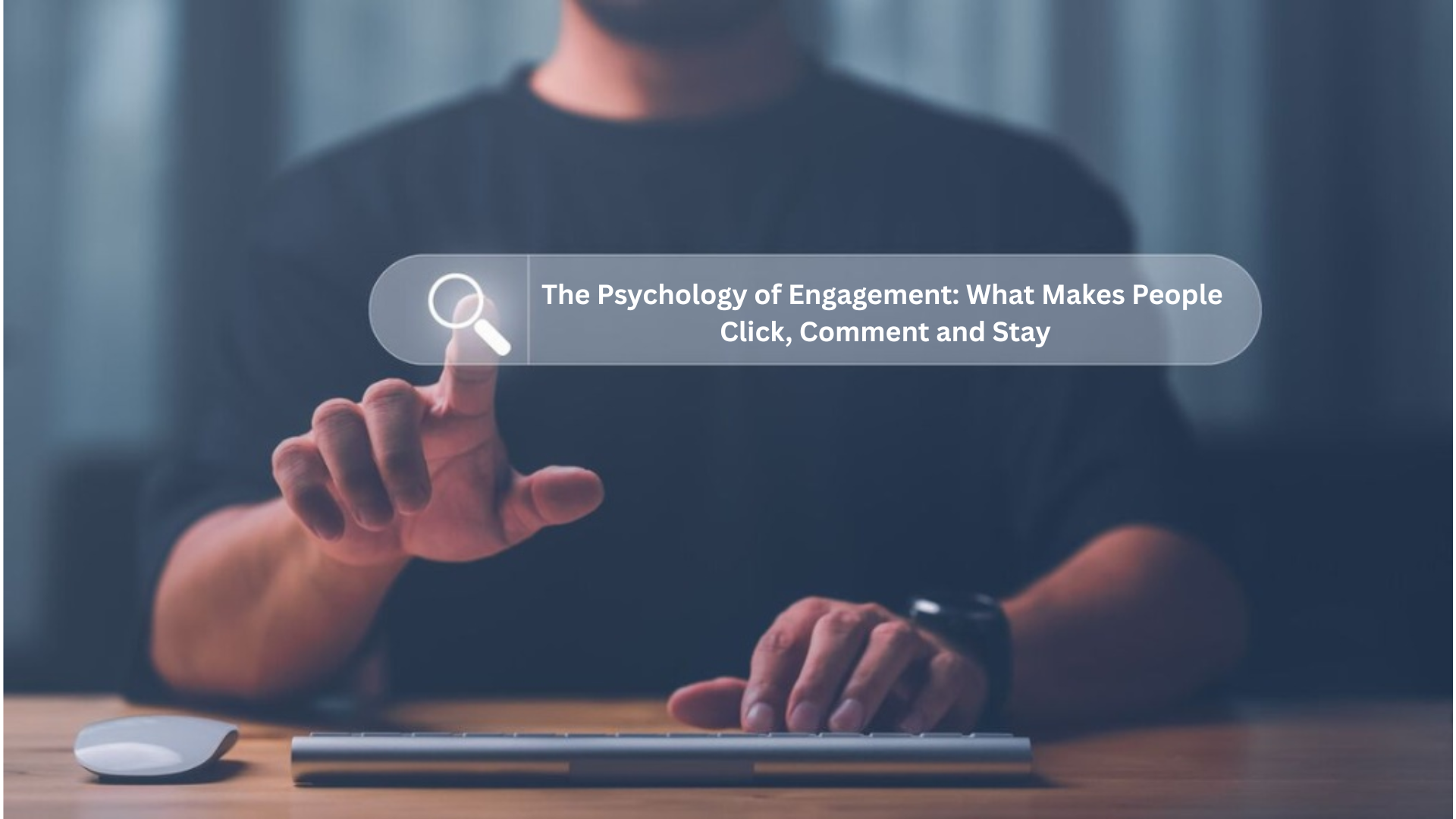The Psychology of Engagement: What Makes People Click, Comment, and Stay

Have you ever wondered why some posts instantly grab attention while others go unnoticed? Why people click certain links, leave comments, or keep scrolling on a page longer than expected? The secret lies not in luck or algorithms alone it’s psychology. Understanding what triggers engagement is the key to building stronger connections online.
The Science Behind the Click
Every click comes from a tiny emotional or psychological trigger. It could be curiosity, excitement, or even fear of missing out — what marketers often call FOMO. According to HubSpot, 47% of consumers read at least three to five pieces of content before making a purchase decision. That means your digital content isn’t just about visibility — it’s about connection.
When people feel emotionally connected to what they see online, they’re more likely to engage. This is why headlines matter so much. A CoSchedule study found that posts with emotional headlines get up to 20% more clicks than neutral ones. The psychology here is simple people act on emotion first and logic later.
Why People Comment and Interact
Engagement goes beyond just clicking. Comments, shares and discussions happen when people feel seen and understood. Humans have a natural need for belonging, and online communities satisfy that. When users comment, they’re not just reacting to content they’re expressing their identity.
This is why it’s important for brands to create conversations, not just content. Responding to comments, asking questions, and encouraging feedback are small gestures that make audiences feel valued. Platforms like online boost help brands build and maintain this connection by optimizing engagement strategies that speak to real human behavior, not just numbers.
The Power of Visuals and Emotion
It’s said that a picture speaks a thousand words but online, it also holds a thousand clicks. According to research by Venngage, visual content increases engagement by 80% compared to text-only posts. Why? Because our brains process images 60,000 times faster than text.
Visuals evoke emotion instantly a smile, a color scheme, a relatable meme all spark quick responses that make people stop scrolling. Combine those visuals with a relatable story and you have a formula for retention. That’s what keeps users not just clicking but staying.
Trust: The Ultimate Engagement Trigger
People engage with what they trust. It’s as simple as that. Before users share buy, or subscribe, they subconsciously ask, “Can I trust this?” Building that trust takes time, consistency and social proof.
According to BrightLocal, 88% of people trust online reviews as much as personal recommendations. That’s why showcasing authentic feedback is crucial. Businesses can strategically enhance credibility through reputation-building Platform or even services that allow you to buy review online, provided they’re used transparently and ethically. When real customers see genuine positive feedback, engagement naturally increases.
Trust transforms casual visitors into loyal followers and loyal followers into advocates who engage without hesitation.
The Dopamine Effect: Why People Stay
Ever notice how scrolling through social media can feel addictive? That’s not an accident. Platforms are designed around the brain’s dopamine response the “feel-good” chemical released when we experience pleasure or reward. Each like, comment, or notification gives users a small dopamine hit, encouraging them to stay longer and return more often.
For businesses, understanding this means creating experiences that continually reward the audience through valuable content, appreciation, and consistency. It’s not about manipulation; it’s about aligning your content with what psychologically motivates engagement.
Content That Keeps People Coming Back
Great engagement isn’t about going viral once. It’s about creating content systems that keep people coming back for more. This includes storytelling, consistency and authenticity.
A Sprout Social report revealed that 64% of consumers want brands to connect with them, not just sell to them. That means using content to inspire, educate, and entertain. When people see your content as a source of value rather than just marketing, engagement becomes natural.
That’s where professional support from platforms like online boost can make a difference. They help brands create meaningful digital systems that drive engagement —not through tricks, but through understanding audience psychology.
Building Engagement Through Community
True engagement isn’t a one-time reaction — it’s a relationship. The most successful brands build communities around shared values and experiences. Look at brands like Apple or Nike — their audiences engage not just with products but with identity.
Small businesses can do the same by building online communities, whether through social media groups, comment sections, or newsletters. Every interaction counts because it reinforces emotional connection. When people feel part of something bigger, they naturally click, comment, and stay.
Conclusion
At its core, engagement isn’t about algorithms or luck — it’s about human psychology. People click when they’re curious, comment when they care, and stay when they feel connected. From emotional triggers and visuals to trust and community, every detail shapes how audiences respond.
By understanding these psychological patterns and applying them through thoughtful strategies — like those offered by online boost — businesses can move beyond surface-level engagement and create meaningful relationships. And with Platform to buy review online and build credibility, they can strengthen the trust that keeps audiences coming back.
So, the next time you post something online, remember every like, share or comment isn’t random. It’s a reflection of connection, emotion and the psychology that powers real engagement.
- Art
- Causes
- Crafts
- Dance
- Drinks
- Film
- Fitness
- Food
- Games
- Gardening
- Health
- Home
- Literature
- Music
- Networking
- Other
- Party
- Religion
- Shopping
- Sports
- Theater
- Wellness


